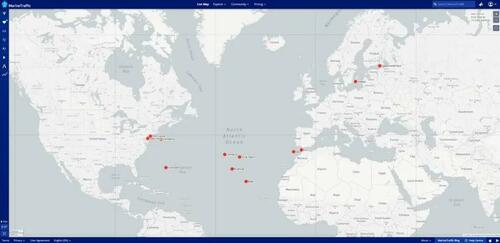Flotilla Of 12 Tankers Carrying Russian Oil Approaching The US
At a time when the mere thought of Russian vodka or caviar, let alone oil or gas, prompts uncontrollable shaking and revulsion, Reuters reports that no less than 12 tankers carrying Russia-linked cargoes of crude and refined products were approaching the United States on Wednesday, as suppliers rushed to deliver ahead of the U.S. government’s deadline to wind down Russian energy purchases, data from traders and Refinitiv Eikon showed.
While the US recently banned Russian energy product imports due to the invasion of Ukraine, Washington’s ban gives importers a 45-day window until April 22 to discharge cargoes moving under pre-ban contracts. At least one tanker heading to the United States and carrying fuel oil has diverted, and at least two others that stopped at Russian terminals are awaiting discharge at U.S. ports.
Despite the ban, Vortexa data analyzed by energy strategist Clay Seigle showed that U.S. crude and products arrivals from Russia are provisionally forecast at 18 million barrels, or 597,000 barrels per day (bpd) on average this month. That compared with an average of 672,000 bpd last year. “U.S. importers need to consider not only the legal risk, but also the reputational risk for dealing in sanctioned or stigmatized oil products,” Seigle added.
Yes, but that is the case only after the 45-day window expires in more than a month. Meanwhile, oil tanker Elli, which was bound for the United States after docking at a Russian port, is now anchored near toward Ceuta on Morocco’s northern coast. Beijing Spirit, carrying Russian crude, was bound for the United States, diverted to France, and now signals a March 26 arrival in Philadelphia, Refinitiv showed.
Then again, not all tankers will likely make it. Halkidon Shipping which manages the Elli, said the vessel “was instructed by her charterers to remain and await orders off Gibraltar, while en-route from Novorossiisk, Russia, to the U.S. Gulf Coast.”
On Wednesday, tanker Confidence that had docked at a Russian port and was chartered by U.S. refiner Phillips 66 was anchored near New York harbor with a cargo of vacuum gas oil. The Confidence is not encumbered by sanctions, an official at vessel manager Dynacom Tanker said on Wednesday.
“If it does (in the future), it will certainly not sail to the United States,” the Dynacom official said on condition of anonymity.
Meanwhile, according to American Shipper, at least two tankers were loaded with Russian oil and departed for U.S. destinations, according to information obtained by American Shipper. MarineTraffic data shows the two tankers as the Vinjerac, which departed Thursday and is headed for the Port of New York & New Jersey for a March 25 arrival, and the Gazpromneft NORD, which loaded on Friday. Its anticipated arrival in the U.S. (port unidentified) is May 16, which is after the window closes and thus could not legally discharge its oil.
MarineTraffic identified 12 tankers in total as part of the “flotilla” traveling with Russian oil to the U.S.
“We can see these tankers are currently traveling at 11-12 knots on average — which is, in general, a normal speed for a commercial tanker on this journey,” said Fotini Tseroni, spokesperson at MarineTraffic.
Two of the tankers have already arrived in the U.S. and were discharging oil — the Tom Louise at the Port of New York & New Jersey, and the Seoul Spirit in Delaware. Maritime sources told American Shipper that some of the buyers include Phillips 66; Total’s trading organization, Atlantic Trading and Marketing Inc; oil trading company Vitol; PBF Energy; and Valero.
While these oil contracts were made prior to Russia’s invasion of Ukraine, they could have been canceled. Also, tanker cargoes can be traded en route, so there is a possibility the Russian oil may not end up in the U.S. Even after the ships reach the U.S., there is no guarantee they will be able to discharge the Russian oil. The International Longshore and Warehouse Union (ILWU) announced last week that its dockworkers “will not load or unload any Russian cargo coming into or going out of all 29 U.S. West Coast ports.”
“With this action in solidarity with the people of #Ukraine, we send a strong message that we unequivocally condemn the Russian invasion,” said ILWU International President Willie Adams in a Twitter thread.
The tanker ship Balla left Russia on Feb. 21 and is scheduled to arrive at the Port of Los Angeles on April 8.
Still, the possibility of keeping the contracts and taking on Russian oil may force buyers into a potential profits-or-people dilemma. Do companies take on the oil … or do they cancel their contracts and damage their bottom lines? The 45-day window now accelerates the decision-making process.
Recently, Shell faced a backlash after purchasing Russian oil and announced afterward that it would donate profits to humanitarian groups working to help the Ukrainian people.
A Ukrainian official on Tuesday called on western oil companies to completely boycott Russian ports and oil, asking U.S. based Chevron, which ships oil from Kazakhstan oilfields through the CPC, to halt the shipments. Chevron said it complies with U.S. laws and its share of oil put into the pipeline is certified as of Kazakhstan origin. It did not comment on the request to halt loadings at the Russian port.
https://ift.tt/vzKx6HV
from ZeroHedge News https://ift.tt/vzKx6HV
via IFTTT



0 comments
Post a Comment